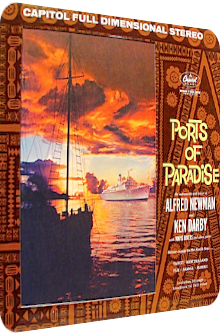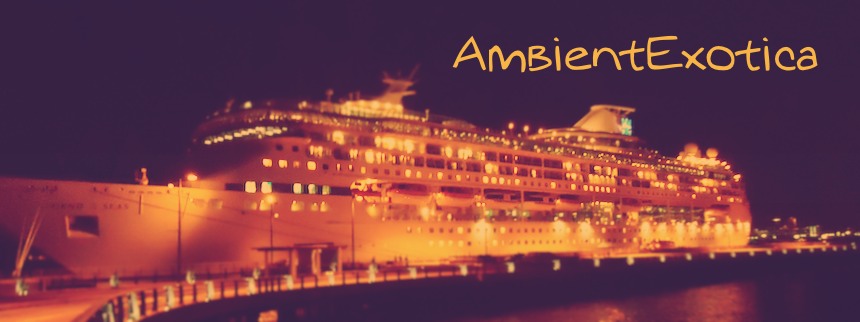
Alfred Newman & Ken Darby
Ports Of Paradise
1960
What happens if you mix the choir-driven Exotica compositions of Eden Ahbez's Eden's Island and merge them with the cinematic Hollywood strings of Nelson Riddle, and then amplify both styles big time? Unsurprisingly, you'll receive Ports Of Paradise, a high budget production by Alfred Newman (1901–1970) and Ken Darby (1909–1992), released in 1960 and presented by David L. Miller. Exotica as a genre cannot get any bigger than this.
The choir is huge, the strings lush and the atmosphere loaded with melodrama. Three compositions are written by Newman/Darby, while the remaining eight tracks – yes, it's an eleven-track album – consist of classic Latin or Polynesian material. Ports Of Paradise is not for everyone: the mood is often heavy, the choir is lamenting in minor and induces a pompous feeling that is so utterly thick that the humble origins of the genre cannot be recognized most of the times anymore. And yet there are welcome glints of proper Exotica moments scattered throughout the release: glistening vibraphones, paradisiacal flutes and phantasmagoric wind chimes are fragile counterparts to the endemic heaviness. These devices elevate the album into higher spheres, despite its melancholia.
Ports Of Pleasure is one of three compositions the duo of Newman and Darby come up with. It furthermore proves the cinematic scope of this big production by starting with beautiful backing strings and spiraling xylophone melodies. The choir is introduced almost immediately, and the horn ensemble plays a rising theme that culminates in a large timpani eruption. After a short pause, the song becomes all mellifluous. The large choir sings in a melodramatic way, and it is at this very moment that the listener really catches Newman’s and Darby’s delusion of grandeur, for this choir is huge and the concert hall in which the album is recorded throws back the echoes and reverberations of every instrument and crescendo. Think of Ahbez’s aforementioned LP Eden’s Island, increase its choir sixfold, and you get a pretty good idea of Ports Of Paradise.
The 3/4 time composition of Frank Metis and Randy Starr The Enchanted Sea adds a strong flavor of mystique to the album with its beautiful beginning of wind chimes and lamenting chants which are followed by a pirate-like choir of bass voices and a mellow concoction of a flügelhorn and string washes. The last third of the song, however, breaks the dreamy mood with hectic drums, Tahiti chants and majestically gleaming brass sections. While the short Blue Tahitian Moon by Alfred Newman and lyricist Mack Gordon returns to the resplendently furnished wonderland of Exotica with Hollywood strings, convivially quavering flutes and a softer, reduced choir, Jack Brook’s and Eddie Lund’s ultra-short Farewell For Just Awhile is presented with a surprisingly life-like field recording of ocean waves and distant birds, a strangely spectral interpretation of the choir that seems to flow over the gently coruscating vibraphone-marimba coupling.
Now Is The Hour is a cinematic offering of almost five minutes with a terrific beginning of mysteriously spiraling vibraphone sparkles, orchestra bells, stomping drums and mercurial melodies played on flutes and violins. The latter instruments then lead to the principal part and evoke an auroral landscape of mesmerizing proportions. The flutes are clearly audible, and the violins are played in major most of the time. Due to the short sprinkles of typical Chinese keys and the surprising rhythm shift at the end I consider this song a proper Exotica entry. It throws many moods into the mix, creating a diversified superstructure of clichéd yet powerful orchestrations.
The next song is a real treat, for Mavis Rivers comes on board to sing Isa Lei, one of two featured compositions by Sweet Leilani composer Harry Owens. Her silky voice is perfectly surrounded by brightly colored violin washes, glinting vibraphone droplets and an echoing backing choir. It is really the voice of Rivers that carries the whole track, so if you like her performance, chances are good that this track opens the whole album to you. Whispering Wind finds Darby and Newman together again, and it starts with stereo-panned wind gusts, frosty wind chimes and an eerie repetitive theme on a piano. Enigmatic flute melodies and an almost lamenting choir make this an unsuspectedly glacial tune which then morphs into highly melodramatic but euphonious realms. This song consists of many spaces and empty alcoves, it is pulsating all the time. I could picture this song played by a quartet in a newer, reduced setup.
My Little Grass Shack blends the percussion-driven essence of Exotica quite well with the orchestral pomposity, and it is the violin strings that sound overly lavish and warped on this tune, like in Les Baxter’s later compositions. Mavis Rivers is responsible for the vocals yet again. Definitely the most accessible song due to its upbeat rhythm, the well-known lyrics and a welcome reduction of melodrama and romance. However, these elements find their ways back in Forevermore, a song originally written by Milt Raskin and Charles E. King. Sumptuous violin strings, male backing choirs and a female opera singer sum up the song pretty much, as there is really nothing else worth mentioning, there are neither curlicues nor specifically exotic instruments.
The penultimate song Madonna For The Flowers is the last Darby/Newman cooperation of the album and at the same time the longest tune with over five minutes. Even though it is entirely convivial and even features short faux-a cappella sections that are only accompanied by low-volume double bass backings, the saccharine presentation is too much for my liking. The final To You Sweetheart, Aloha by Harry Owens ends the album on a splendid note, though, with the magnificent mystique that is so typical for Exotica releases: flittering wind chimes, cascading marimba melodies and other joyful additions make the first fifty seconds of this rendition one of the best introductory sections of the genre! After these fifty seconds, however, the orchestra is at it again, with a special focus on the brass players and a secondary inclusion of melting Hollywood strings. The choir sounds melodramatic as usual, but after all these songs, this isn’t a bad thing anymore. If this orchestral setting is your kind of thing, you will surely like this rendition, since after all the intimate versions, it is rather refreshing to hear a take by a full-force orchestra.
There's intimate Exotica music made by quartets or quintets and there's the bigger kind with lots of violinists or brass players. Ports Of Paradise takes the cake, though. Everything is big on this release, but at the same time there are sections of transitions with quieter, dreamier moments filled with mallet instruments and flutes. The introduction or the closing phase of most tracks fall into that category. In fact, some of the introdoctury melodies are among the most soothing of the genre; likewise, the rhythm shifts make the last minute or so worthwile, for example with hectic drums.
All in all, Ports Of Paradise is still hard to love, I'm afraid. The melodramatic fashion is almost unbearable, and the performance of the choir, while emotional and to the point, is too heavy and gargantuan for both the Exotica or the Easy Listening genre. Maybe it isn't wise to see this album as an Exotica release. But then again, most of its tracks allow such an interpretation. It's definitely a highlight due to its huge scope, so if you're fed up with the various quartet releases and want to experience pompous arrangements that even outdo the resplendent approach of Les Baxter, Ports Of Paradise (not to be mixed up with Baxter’s Ports Of Pleasure!) definitely is the release that accomplishes this. If you're not sure, give the exotic cuts of My Little Grass Shack and Isa Lei a chance, both of which incidentally feature main vocals by Mavis Rivers. The album was re-issued on CD in 2006 by the EMI record label and is also available on iTunes.
Ambient Review 085: Alfred Newman & Ken Darby – Ports Of Paradise (1960). Originally published on Jun. 23, 2012 at AmbientExotica.com.
